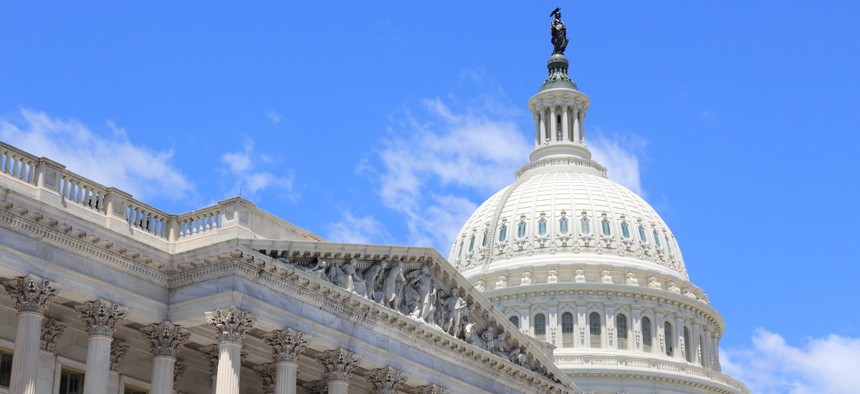Earlier in the year, McSally was seen as a top contender to secure the governor’s appointment to McCain’s seat. But she’s now favored to win the GOP primary on Tuesday and face Democratic Representative Kyrsten Sinema in a toss-up race that could determine the Senate majority after November.

Tupungato/Shutterstock.com
What John McCain’s Death Means for Republican Control of the Senate
After the late Arizonan’s prolonged absence, the appointment of a replacement by Governor Doug Ducey will temporarily bolster the GOP’s advantage.
John McCain’s death will deprive the Senate of one of its longest-serving members, its leading military hawk and champion of interventionist U.S. foreign policy, and a Republican who regularly sought—and often struck—significant accords with Democrats.
But in the short term, the loss of the Arizona senator and elder statesman is likely to bolster the GOP’s majority in the chamber, as well as its party unity.
McCain had not voted on the floor since December as he underwent treatment for brain cancer in Arizona—an absence that reduced the already narrow Republican advantage of 51–49 to a single vote. Governor Doug Ducey, a Republican seeking reelection this fall, will name McCain’s successor, who will serve until a special election is held in 2020 to fill out the remainder of his term. McCain had won a sixth term in 2016 that goes until 2022.
Ducey has said little about who he might pick, and his office said over the weekend that the governor would wait until after McCain is buried on Sunday to announce his selection. But he is required by Arizona law to pick a Republican, and that fact alone should make it easier for Senate Majority Leader Mitch McConnell to push through the confirmation of President Donald Trump’s Supreme Court nominee, Brett Kavanaugh, and other conservative jurists and presidential nominees this fall.
“I think he'll take his time, and he’ll make a conservative Republican choice,” said Chuck Coughlin, a longtime GOP consultant in Arizona who got his start in politics working for McCain’s first Senate campaign in 1986.
Potential contenders for the appointment include Ducey’s chief of staff, Kirk Adams; Karrin Taylor Robson, a member of the state Board of Regents; Eileen Klein, whom the governor appointed last year to serve as state treasurer; the businesswoman Barbara Barrett; and two former congressmen, John Shadegg and Matt Salmon.
All are likely to vote more conservatively than McCain, who occasionally broke with Republican leaders over the years and famously helped torpedo the party’s effort to repeal the Affordable Care Act in 2017.
The wild card in the mix is McCain’s widow, Cindy McCain, whose appointment to replace her husband has been pushed behind the scenes by the late senator’s loyalists. Ducey and his wife went to visit John McCain at his Sedona ranch in May, but it is not known whether they discussed who might replace him in the Senate. (The governor’s spokesman did not return a request for comment on Monday.)
Coughlin told me he did not expect Ducey to pick Cindy McCain unless the ailing McCain had specifically asked him to. “If it was spoken, I think he would honor it,” he said. Rick Davis, McCain’s former campaign manager who is serving as a spokesman for the family, would not address a possible appointment for Cindy McCain during a briefing with reporters Monday in Arizona. Asked who McCain might have wanted to replace him, Davis said the senator likely would have picked “a Hispanic woman” if he had the opportunity to endorse a successor in retirement.
Ducey will name McCain’s replacement during a busy election season in Arizona. Primary elections are on Tuesday. The governor himself is on the ballot (with an endorsement from Trump), but the more closely watched contest is the race to replace Senator Jeff Flake, the Trump critic who decided to retire after a single term rather than align himself more closely with the president during a competitive primary. Vying to fill his seat on the Republican side are Representative Martha McSally, the establishment favorite; Kelli Ward, the Tea Party conservative who tried to oust McCain in 2016; and Sheriff Joe Arpaio, the immigration hard-liner who last year received a presidential pardon from Trump for a criminal conviction for contempt of court.
McCain’s allies have expressed hope that Ducey would pick someone in the late senator’s mold—a conservative but independent voice unafraid of standing up to Trump. Flake told reporters he preferred “senators whose minds haven’t been captured”—a biting reference to Trump’s infamous disparagement of McCain’s Vietnam War record in 2015.
But as in states across the nation, the GOP in Arizona has become more Trump’s party than McCain’s, a fact that was underscored by Flake’s decision to quit rather than face a likely primary defeat. With Ward and Arpaio hugging the president tightly, McSally has been forced to embrace Trump, too, and veer to the right after voting as a moderate during her first years in Congress.
In one fantasy scenario floated by McCain-friendly Republican operatives on Twitter, Flake would resign his seat so that Ducey could appoint him to fill McCain’s, giving him another two years in the Senate before he had to face voters again. When I asked Coughlin about the likelihood of that happening, he laughed. “An ice cube in hell comes to mind,” he replied.
Ducey “is very risk averse,” the veteran Arizona operative told me, which means that the next Republican senator is likely to be more friendly to the president than either McCain or Flake. “I’ve got a lot of people saying, ‘Well, who’s going to be the criticizer of Trump?’” Coughlin told me. “Nobody’s going to do that. That’s not going to be the next person.”






